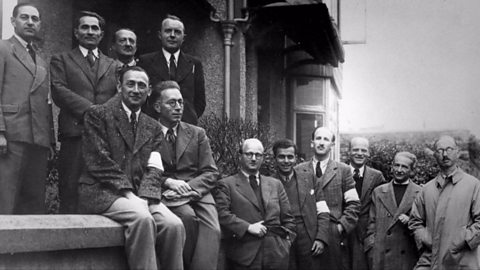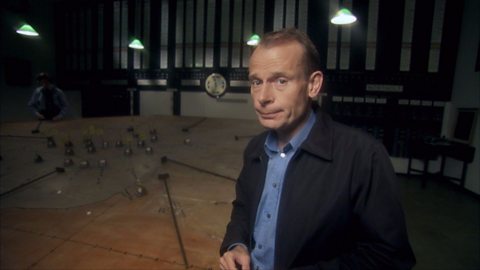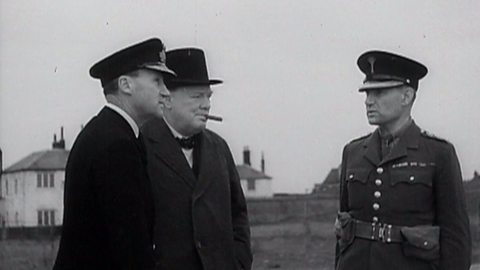DAN SNOW: Hi, I'm Dan Snow, and I'm here to talk to you about fake news. Fake World War Two news that is, because we're looking at the history of that conflict using clips from the archives of the 91╚╚▒Č.
In this one coming up, Larry Lamb is finding out how the war didnÔÇÖt just involve soldiers, planes and ships, but also special radio broadcasts that the British used to try and trick the people of Germany into thinking the war wasn't going their way.
LARRY LAMB: Away from the frontline of battle, during the Second World War, an altogether different campaign was being fought from the heart of the English countryside.
The Ashdown forest in Sussex was the location of one of Britain's most important secret weapons, and it was called Aspidistra.
Aspidistra was a powerful transmitter. The plan was to use it to broadcast fake German programs to the Germans, spreading misinformation and propaganda.
So why did we need Aspidistra?
ASPIDISTRA HISTORIAN: Well, by 1941, Britain was losing the propaganda war with Nazi Germany who had far more transmitters and much greater firepower. Winston Churchill understood the power of radio broadcast and authorised the purchase of Aspidistra, not just to compete with the Germans but to completely overwhelm them.
LARRY LAMB: The transmitter was installed in a vast underground bunker with three masts above ground level.
Here in the middle of nowhere, how did they do it, how did they build it?
ASPIDISTRA HISTORIAN: Well there was a regiment of Canadian army engineers and it took them six weeks just to build the 50 foot hole which housed the transmitter. And then, on top of that, a four foot thick reinforced concrete roof with walls. And in all it took 600 men working around the clock to complete it.
LARRY LAMB: Named after the hit song by Gracie Fields, The Biggest Aspidistra In The World, It began transmitting on November the 8th, 1942, from deep underground.
Les Rawlings worked on the transmitter after the war and has archive of the transmissions.
So Les, these are some of the original recordings that were broadcast from here, yeah?
LES RAWLINGS: Yes, would you like a little listen?
LARRY LAMB: Yeah.
LES RAWLINGS: See what you make of that.
LARRY LAMB: So, how convincing would a program like that have been?
LES RAWLINGS: Well, all the music programs the Germans would have liked and the normal announcements that would have appeared on German forces radio were faded in so the Germans were thoroughly convinced it was their own station.
LARRY LAMB: Aspidistra was also used to jam the commands given to German fighter pilots, leaving our aircraft at less risk from attack during bombing raids.
LES RAWLINGS: And, of course, this will eventually save us aircraft being shot down.
LARRY LAMB: And did it save a lot of aircraft?
LES RAWLINGS: Well, at one time in the war, the Air Ministry did say that we were saving up to 35 aircraft a night.
LARRY LAMB: But the effects of the transmissions were felt in unlikely places.
The transmitter was so powerful that the locals said they could hear German voices coming out of the wire around the site.
LES RAWLINGS: Around the village, of course, things affected were telephones, people would pick up their telephones and there was the news in German. And hearing aids in those days, of course, were fairly simple devices and the poor people couldnÔÇÖt hear what was going on in the room, but they could what was going out to Germany.
LARRY LAMB: But the campaign wasn't without controversy. When messages were sent to German U-boats falsely claiming that the hometown of one of their commanders had been bombed, some felt tactics like this went too far.
ASPIDISTRA HISTORIAN: Sir Stafford Cripps, Lord Privy Seal, a member of the war cabinet argued that we should be broadcasting messages of hope and sympathy to Europe. Not black propaganda.
LARRY LAMB: But the broadcasts continued until the end of the war.
ASPIDISTRA HISTORIAN: The sheer scale of Aspidistra made it a very important weapon of war, just as Churchill intended. And it was a very big help in defeating the formidable Nazi propaganda machine and turning the war of words in Britain's favour.
LARRY LAMB: The Second Word War was fought on all fronts: the air, the land and the sea. But it's clear that the secret work of the people here in this remote corner of Sussex also played a crucial role in the Allied victory.
DAN SNOW: And as for what sort of messages Aspidistra was sending over to Germany, one example was to say that fake bank notes were in circulation so the Germans would start panicking that their money was worthless.
We even tried to confuse the German public by sending reports that alerted them to the fact that some of their radio programmes were fake propaganda and coming from Britain. To be honest, if that's not confusing, I don't know what is.
Video summary
Larry Lamb investigates the use of fake news by Britain in World War Two.
Winston Churchill authorised the set up of a transmitter, Aspidistra, which began transmitting programmes in 1942.
The broadcasts would try to convince the German people that the war was going badly for their country.
The transmitter was also used to jam the signals being sent to German planes, to help protect British aircraft.
The air ministry estimated the work of Aspidistra was saving up to 35 British planes a night.
This short film is from the 91╚╚▒Č series, World War Two with Dan Snow.
Teacher Notes
Key Stage 3:
Students could be asked to write down what they understand by the term ÔÇśfake newsÔÇÖ and where they have heard it.
Then ask them if they think fake news is always a problem or if there are any times when it could be problematic.
Then they should be shown this short film and asked if they think it was a fair tactic to broadcast ÔÇśfake newsÔÇÖ during World War Two.
What might the broadcasts need to include to convince people they were real?
Why would it be so important to Britain to convince people in Germany the war was going badly for them - what difference might that make?
Key Stage 4 / GCSE:
This could be used as part of a lesson evaluating the use of propaganda as a historical source of information.
What use is there to a historian of ÔÇśfake newsÔÇÖ produced by Britain during World War Two?
This will help support students thinking about usefulness and reliability, and the importance of propaganda as well as military tactics during a war.
This short film will be relevant for teaching KS3 and KS4/GCSE history in England, Wales and Northern Ireland and National 4/5 history in Scotland.
Treatment of immigrants in Britain during World War Two. video
Andrew Marr looks at the internment of Italian immigrants in Britain during World War Two.

How did RAF tactics defeat Germany in the Battle of Britain? video
Andrew Marr looks at tactics used by the RAF in the Battle of Britain, focusing on air defences used to protect Britain against the Luftwaffe.

How did Britain prepare for a German invasion in World War Two? video
Neil Oliver examines the plans made by Britain to prepare for a possible German invasion, with the creation of secret auxiliary units to be a last line of defence.
